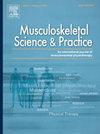Do patients’ preferences and expectations match clinical guidelines? A survey of individuals seeking private primary care for a musculoskeletal disorder
IF 2.2
3区 医学
Q1 REHABILITATION
引用次数: 0
Abstract
Background
Physiotherapists often inconsistently adhere to clinical practice guidelines (CPGs) when managing musculoskeletal disorders (MSKDs), potentially due to discrepancies between patient-valued interventions and guideline recommendations. Since patients’ expectations are important predictors of outcome, this disparity between CPGs recommendations and patient preferences could be problematic for the effective care of MSKDs.
Objectives
To assess patients’ expectations and preferences for the interventions used in their MSKD management and to establish correspondence rates between patients' preferences and recommendations from CPGs.
Design
Survey.
Method
This cross-sectional descriptive study included a survey on sociodemographics, preferences, and expectations towards interventions for their MSKD, acceptable cost of care, number of treatment sessions required, and their involvement in their MSKD management.
Results
One hundred and fifty participants (94 women and 56 men; mean age: 51 ± 17) responded to the survey. Eighty percent of respondents expected their involvement in their MSKD management to be equal to or superior than that of the physiotherapist. Sixty-nine percent of respondents expected to receive exercises, and 67% expected to receive education. Based on preference ratings, 95% of respondents chose recommended interventions, 57% chose interventions with uncertain levels of recommendation, and 48% chose interventions not recommended by CPGs.
Conclusion
Less than 70% of participants expected to receive education and exercises, the two most frequently recommended interventions by CPGs. On the other hand, the majority of respondents indicated that their involvement should be equal to or superior than that of the physiotherapist. This aligns with CPGs, which advocate for active and self-management strategies.
患者的偏好和期望是否符合临床指南?一项针对因肌肉骨骼疾病而寻求私人初级保健的个人的调查。
背景:物理治疗师在处理肌肉骨骼疾病(MSKDs)时,可能由于患者重视的干预措施与指南建议之间的差异,往往不能始终如一地遵守临床实践指南(CPGs)。由于患者的期望是预示治疗效果的重要因素,CPGs 建议与患者偏好之间的这种差异可能会给有效治疗 MSKDs 带来问题:评估患者对 MSKD 治疗中所用干预措施的期望和偏好,并确定患者偏好与 CPGs 建议之间的对应率:方法:横断面描述性研究:这项横断面描述性研究包括一项调查,内容涉及社会人口学、偏好、对 MSKD 干预措施的期望、可接受的护理成本、所需治疗次数以及他们在 MSKD 管理中的参与情况:150 名参与者(94 名女性和 56 名男性;平均年龄:51 ± 17)对调查做出了回应。80%的受访者希望他们参与 MSKD 管理的程度等同于或高于物理治疗师。69%的受访者希望接受锻炼,67%的受访者希望接受教育。根据偏好评级,95% 的受访者选择了推荐的干预措施,57% 的受访者选择了推荐程度不确定的干预措施,48% 的受访者选择了 CPG 未推荐的干预措施:结论:不到 70% 的参与者希望接受教育和锻炼,而这正是 CPG 最常推荐的两种干预措施。另一方面,大多数受访者表示,他们的参与程度应等同于或高于物理治疗师。这与 CPG 所倡导的积极和自我管理策略不谋而合。
本文章由计算机程序翻译,如有差异,请以英文原文为准。
求助全文
约1分钟内获得全文
求助全文
来源期刊

Musculoskeletal Science and Practice
Health Professions-Physical Therapy, Sports Therapy and Rehabilitation
CiteScore
4.10
自引率
8.70%
发文量
152
审稿时长
48 days
期刊介绍:
Musculoskeletal Science & Practice, international journal of musculoskeletal physiotherapy, is a peer-reviewed international journal (previously Manual Therapy), publishing high quality original research, review and Masterclass articles that contribute to improving the clinical understanding of appropriate care processes for musculoskeletal disorders. The journal publishes articles that influence or add to the body of evidence on diagnostic and therapeutic processes, patient centered care, guidelines for musculoskeletal therapeutics and theoretical models that support developments in assessment, diagnosis, clinical reasoning and interventions.
 求助内容:
求助内容: 应助结果提醒方式:
应助结果提醒方式:


